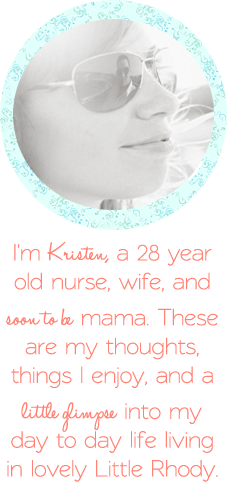I'm often hesitant to post much about my job on the blog. I don't know why, since it is such a huge part of my life. I guess I'm afraid to bore you guys, and although I don't find what I do very boring, someone with little or no medical experience might. But today, I'm going for it.
In the almost
six years that I've been an ICU nurse, I have seen quite a bit. Tragedy, death, joy, miracles. It has really shaped me into the person I am today. So I wanted to share what turned out to be a big part of my weekend.
Friday night was on for the books. I went into work as usual at 7pm and was expecting a slow night. Earlier in the week, our unit only had four patients, out of the eight to ten we usually have. I was armed with my latest Martha Stewart Living catalog, you know, to keep myself awake while my patients slept. You'd think in my six years I would have learned...but whenever I come prepared for a slow night, it turns out to be quite the opposite.
It is kind of interesting to me how, as a nurse, you can "feel" the atmosphere on the unit the moment you step foot through the double doors. Sometimes the day shift nurses will be congregated in the break room, awaiting our arrival and sometimes everyone will still be hard at work, scurrying to tie up loose ends before the change of shift. Tonight, as I walked onto the unit, the atmosphere was stressed. All the day nurses were still in their rooms and everyone seemed super busy. I looked to see what my assignment was and the charge nurse pretty much wished me luck.
My patient, I'll call her G, had just come up from the operating room, and was not expected to make it through the night. She had gone to the OR emergently after developing chest pain earlier that morning. She was only in her early 60's but had many co-morbidities such as diabetes, end stage renal failure requiring dialysis, and obesity, among others...that are not necessarily on your side during and after cardiac surgery.
She underwent coronary artery bypass surgery (CABG) to fix the arteries in her heart that were blocked, and thus causing her chest pain. She was very unstable in the OR and they were unable to close her chest before bringing her up to our unit. Usually, the surgeons will finish doing their job and basically staple the chest back together and bring the patient to our unit to stabilize and recover. They were not able to do this with G. She had an intra-aortic balloon pump placed to help her heart that was only functioning at about 10% of it's capacity. I googled an image of the
intra-aortic balloon pump to give you an idea of what it looks like, but I spared you a photo of the open chest. :)
 |
| A tiny balloon that is inserted through the femoral artery and sits in the aorta. It inflates and deflates as the heart pumps to basically give it a little boost. The photo on the right is the machine that the catheter is attached to, and how we as nurses monitor it's function. |
She was basically on jet fuel as far as medications are concerned...to help keep her heart pumping and maintain a blood pressure. You've probably heard of the hormone Epinephrine? Well this hormone comes in an IV medication form that we use in our patients from time to time to assist their heart function. G was on the highest dose of Epinephrine that I've ever seen in six years, along with numerous other medications.
She was bleeding, much more than the average patient does. She was obviously not the average patient. At the end of my 12 hour shift, we had given her six units of blood and about a dozen other blood products like platelets and plasma to get the bleeding to slow down. To say it was busy would be an understatement. It took two nurses in the room for the first four hours to keep up with everything. And we did. We stabilized her and maintained her vital signs, followed her lab work, and constantly assessed her for any little changes.
And at the end of 12 hours on my feet, she was still alive, and this was more than anyone expected.
When I went back to work on Saturday night, she was still holding her own and when I left yesterday morning, G was heading back to the operating room to have her chest closed. I will be very curious to see how she is doing when I return to work tomorrow night. Although she has quite a long road to recovery in front of her, the first 24 to 48 hours are the most critical, and G made it through.























